Back to blog
6 MIN READ
Mobile App Retention Benchmarks By Industries 2025
PUBLISHED
22 December, 2024

Product Analytics Expert
Retaining users after they’ve installed your app can be an uphill struggle.
But this is common with mobile apps, as the average app loses 77% of daily active users just three days after installation, according to a study done by Business of Apps. Fortunately, mobile app retention benchmarks help product teams assess competitive retention rates.
Mobile app retention benchmarks
To give you an idea of what mobile app retention rate benchmarks look like for different industries, here are examples of retention rates on day 30 following installations worldwide:
| Mobile App Industry | Retention Rate on Day 30 |
|---|---|
| News | 11.3% |
| Business | 5.1% |
| Shopping | 5% |
| Finance | 4.6% |
| Music | 3.8% |
| Food & Drink | 3.7% |
| Health & Fitness | 3.7% |
| Lifestyle | 3.6% |
| Productivity | 3.2% |
| Video players | 3.1% |
| Entertainment | 3% |
| Travel | 3% |
| Social | 2.8% |
| Utilities | 2.6% |
| Gaming | 2.4% |
| Education | 2.1% |
| Photography | 1.5% |
According to a Statista report for mobile app retention rates, they found:
News, business, and shopping apps had the highest retention rates, and News apps surpassed the second-highest industry by 6.2%.
Food and Drink and Health and Fitness had the same retention rate of 3.7%, followed by 3.6% for Lifestyle apps.
Education and Photography had the lowest retention at 2.1% and 1.5%, respectively.
How to set your mobile app retention benchmarks
Use app retention analytics tools
Conduct competitor analysis
Gather competitor app data
Track and collect data regularly
Benchmark based on your historical data trends
Compare with competitor analysis data
Assess performance and repeat
Step 1 - Use app retention analytics tools
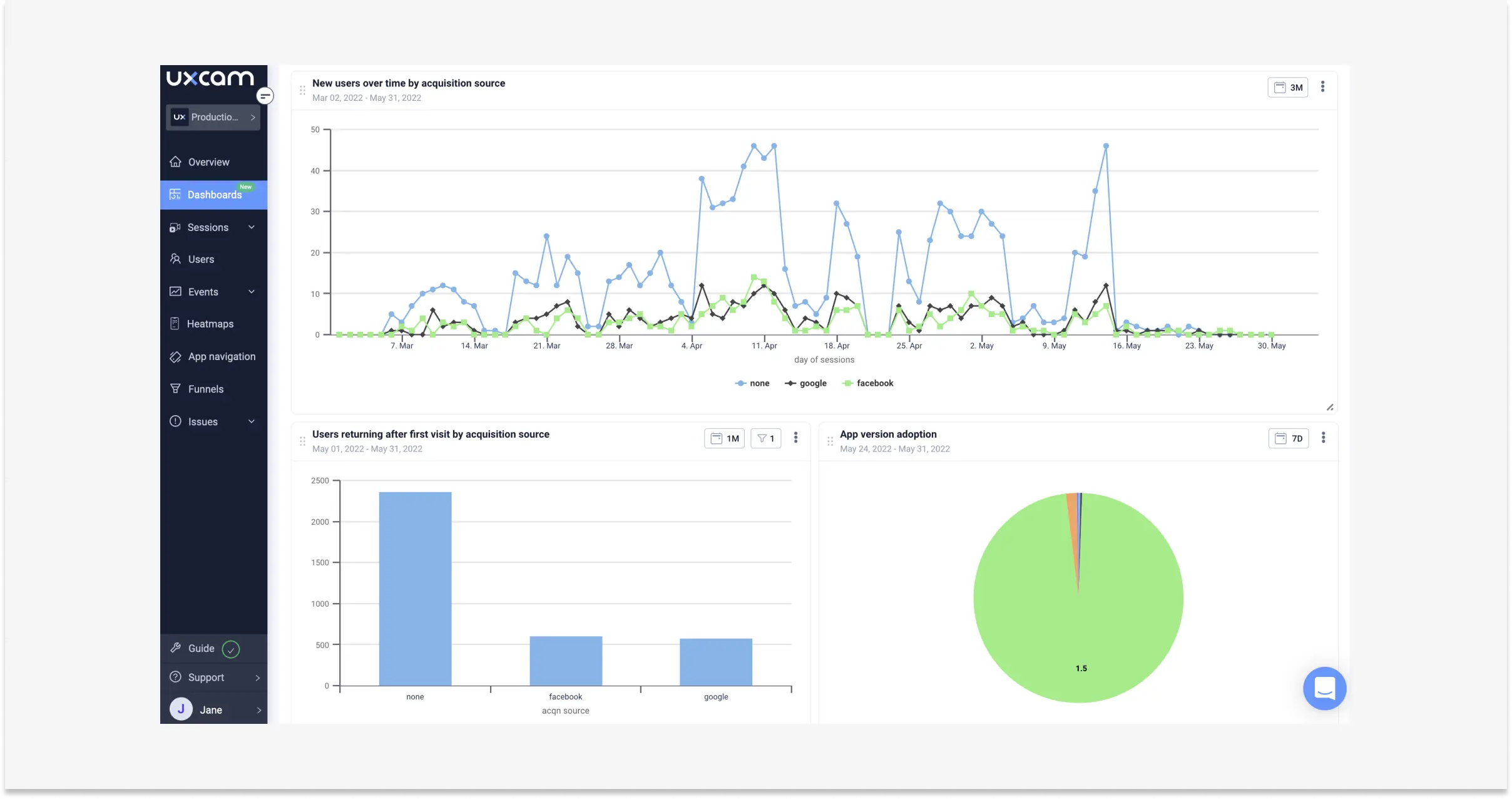
First, look for an excellent behavior analytics tool.
UXCam is designed explicitly for mobile apps and our market-leading, lightweight SDK ensures all your user’s in-app interactions are caught. UXCam silently collects behavior data in the background without disturbing users' front-end experience while respecting user privacy and security.
Our platform not only reports on your daily and monthly active users to set your retention benchmark, but our features are designed to highlight what’s hot and what’s not about your current app design; they include the following:
Journey analysis: Finds pain points and common exit screens along the user’s journey.
Funnel analytics: Shows where users drop off in the funnel and helps you discover new paths with AI.
![funnels analytics product intelligence]()
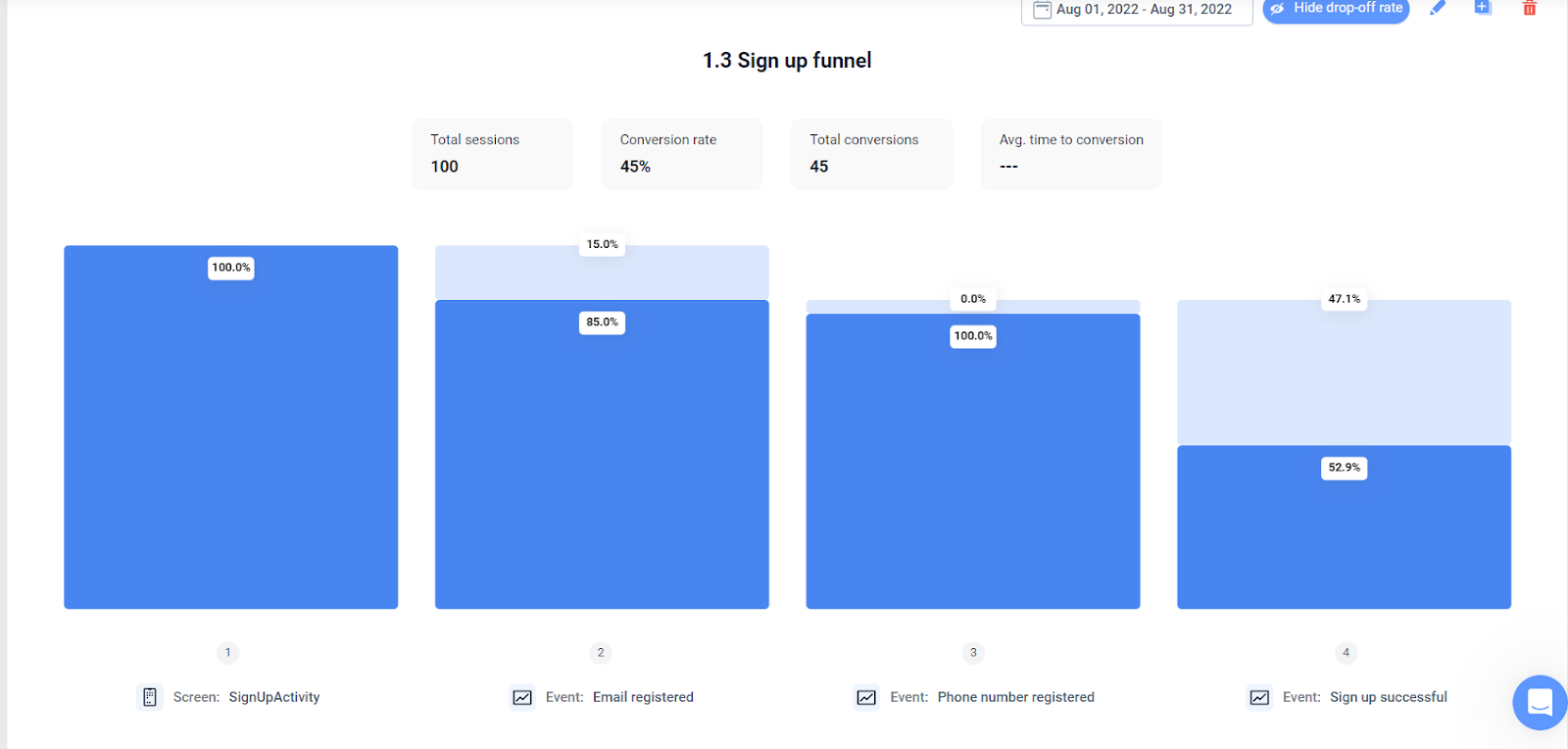
Session replays: Replays your user’s journies so you can see it through their eyes. It includes frustration gestures for a deeper analysis of why people leave.
Heatmaps: Highlights the most and least engaging elements of your UI.
Step 2 - Conduct competitor analysis on mobile app retention data in your niche
There are several benefits to conducting a competitor analysis, including learning about their products and features to strengthen your strategies and increase your market share.
First, find competing apps in your category or niche that:
Share similar features and functionality
Target the same or a similar audience as you
Are available in the App and Google Play stores
Step 3 - Gather competitor app data
To find out the retention rates of your aspiring competitors, you can collect publicly recorded information from the American Center for Productivity and Quality Benchmarking Code documents or consider using a mobile intelligence platform for market averages.
In addition to gathering retention rates, consider conducting a S.W.O.T analysis for the context needed for comparing notes later.
A Strengths, Weaknesses, Opportunities, and Threats analysis allows you to compare your and your competitor's app strengths and weaknesses. Additionally, you can preempt your competitor's next moves by highlighting their threats and opportunities.
Step 4 - Track and collect data regularly (weekly, monthly, etc.)
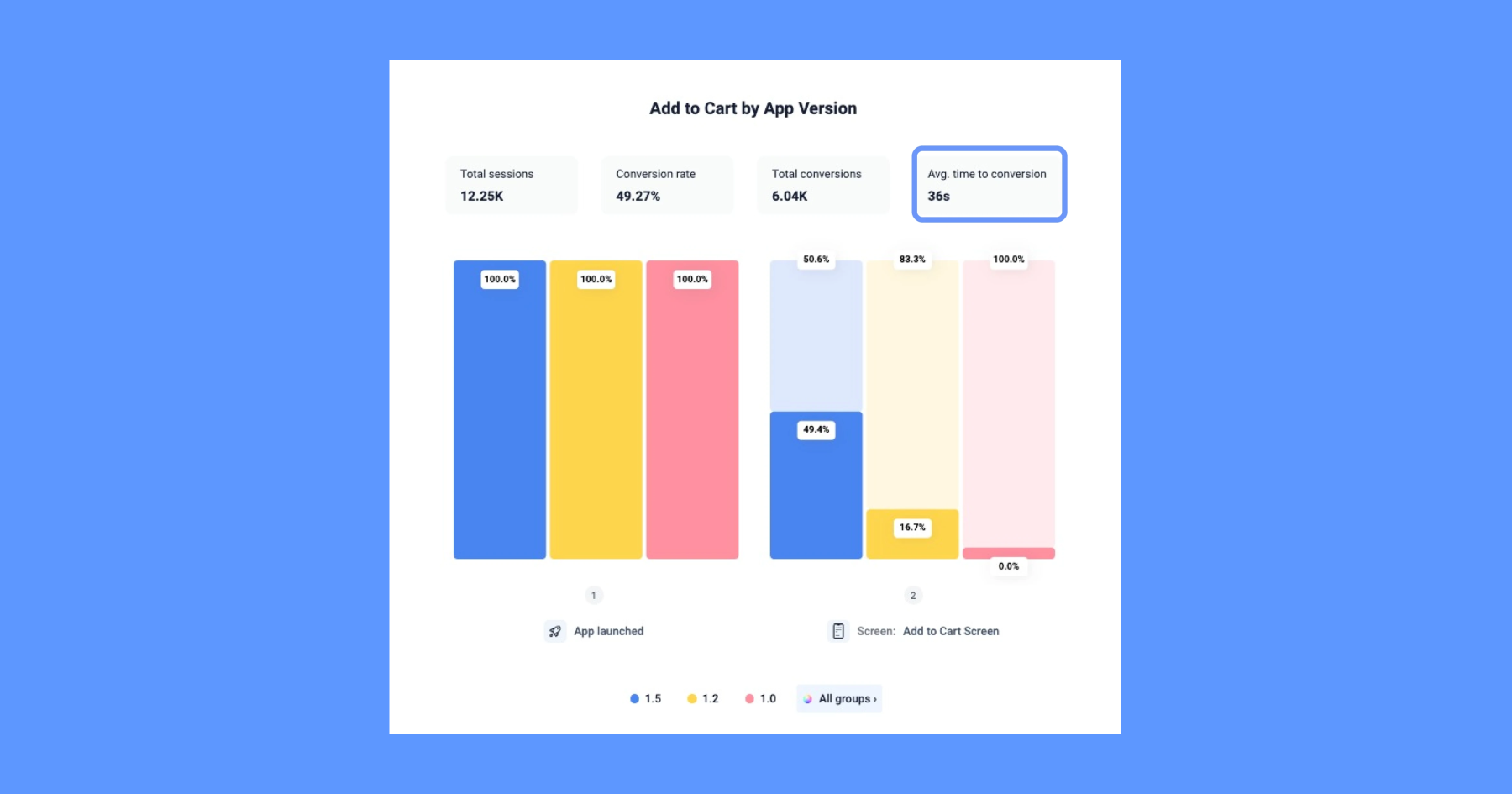

Track and collect qualitative and quantitative data regularly to learn more about your user's in-app interactions throughout their journeys. Our tool uses segmentation to learn common behavioral patterns among groups, including churned users and those showing signs of reduced interest. You can use this data to identify potential design issues and work on strategies to improve problem areas and increase engagement.
Frequently collecting data is essential to keep your app’s retention rate on par with the best in your industry.
Step 5 - Benchmark based on your historical data trends and patterns
Historical data trends and patterns are vital for setting realistic benchmarks for incremental improvements. It helps ensure your goals are achievable and in line with historical trends. Over time, the data will show you the evolution of your app’s retention rate. This data helps make future predictions.

Step 6 - Compare with competitor analysis data
Armed with your retention rates and S.W.O.T analysis, compare the data to learn:
The design areas, features, and functionality that work well for engagement for your competitors' apps.
Outdated elements of features
Design ideas for more engagement and user satisfaction
Your findings will help you decide on achievable yet competitive retention goals to meet or surpass those achieved by your competitors or the industry standard.
Step 7 - Assess performance and repeat
Once you’ve implemented design changes, check your latest retention rate. Has it improved, and is it more in line with your competitors? Did you outdo them? Or has your rate worsened?
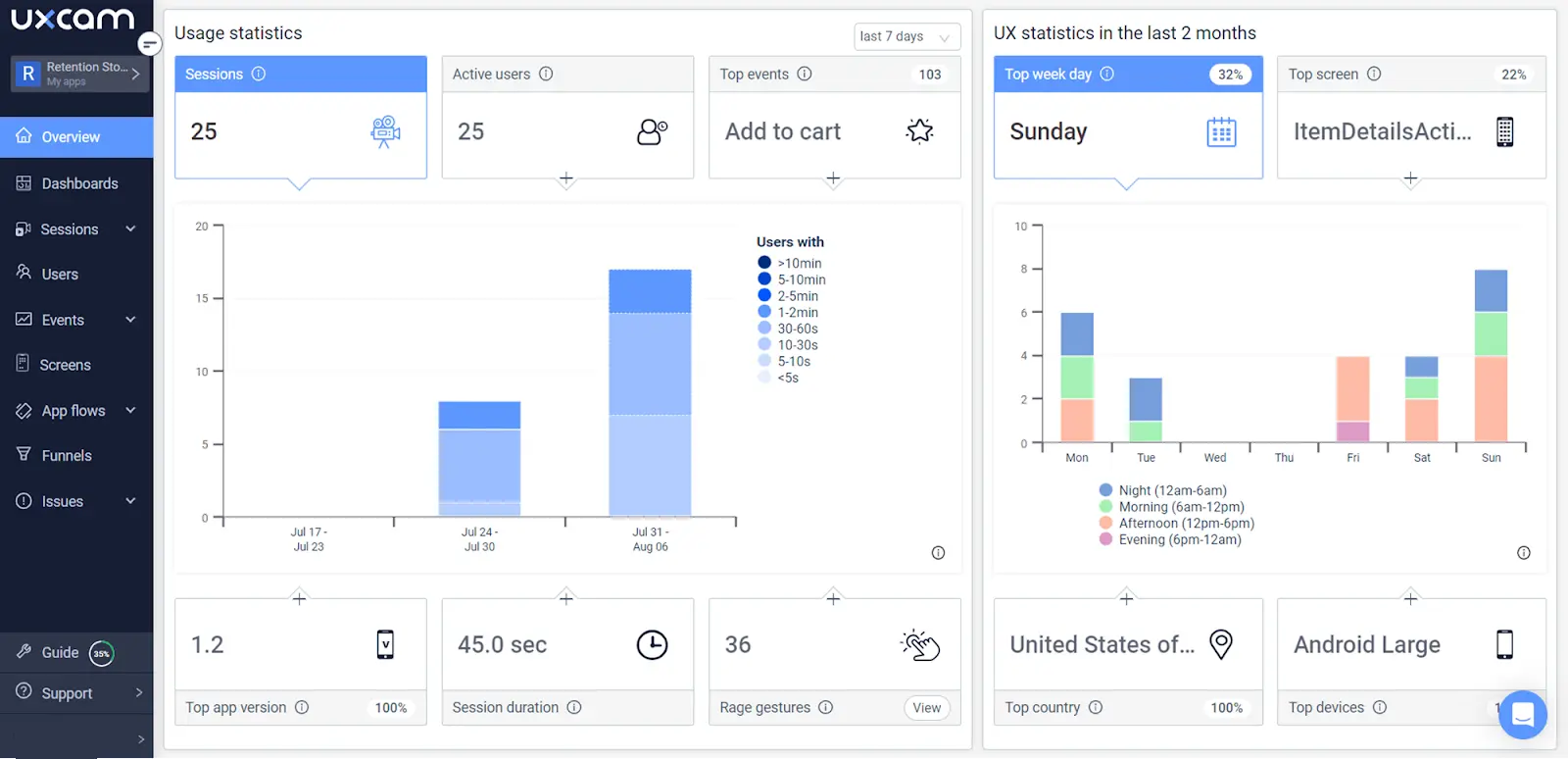
In any outcome, consider using UXCam to discover the adaptation of your new features and whether your users are interacting as expected with your new designs. Use our customizable dashboards to impress your stakeholders with the results and share them company-wide.
Why is mobile app retention important?
It's the foundation for deeper engagement: When a user returns to your app the second and third time, this indicates that they’re becoming loyal and found value within your app.
Highlights possible problems with the user funnel: If your app retention rate is low (a DAU or MAU ratio of around 20% is considered satisfactory), it could point to problems with the user’s journey. For example, if a large number of your user base churns after using the app for a week, you can use a mobile app behavior analytics tool like UXCam to see what roadblocks these users encounter.
More cost-effective: The process of acquiring new customers can be expensive. At least five times more expensive than retaining customers. Encouraging your customers to remain loyal requires less marketing effort and, thus, is more cost-effective.
Why is mobile app retention benchmarking important?
When you benchmark your mobile app’s retention rate, you’ll learn the following:
How does your retention rate compare to others in your industry? You can examine and compare your app design with the highest retention rates in your niche for inspiration. From there, you can identify what makes those apps so sticky and start implementing similar strategies to improve your own.
Whether the strategies you’ve implemented have worked and resulted in a bump in retention rates. If you haven’t noticed any positive changes, it’s back to the drawing board.
Learn whether retention is declining. Tools like UXCam offer robust user behavior analytic tools to highlight where the common friction points along the user’s journey are and other features to discover why users churn.
Best practices to increase mobile app retention
Start tracking user data as early as possible: You need to start collecting data ASAP to accurately measure your retention rate and impact from strategies and new designs.

Offer smooth onboarding: Customer retention can increase by 50% through frictionless and successful onboarding. Conciseness and little touches like UX gamification can create a great onboarding experience and higher engagement.
Conduct App Store Optimization (ASO): Attract high-value customers and organic traffic by getting your app to rank higher in the App Store. Focus on your App Store entry, the name, description, keywords, screenshots, and videos.
Deliver personalized UX: Personalized in-app experiences are now expected. In-app messages, for example, have been proven to boost retention by 30%.
Reward loyal and engaged users: People love rewards. The Hierarchy of Rewards is based on rewards' power to engage users and increase retention rates.
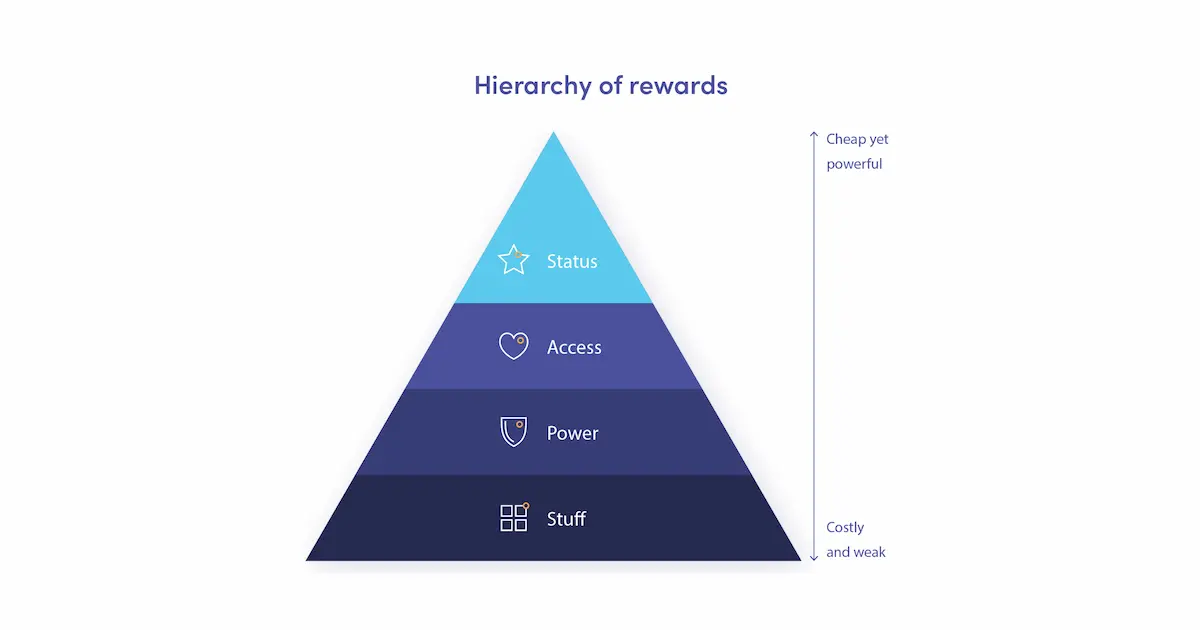
The Status, Access, Power, and Stuff (SAPS) chart demonstrates cheap and powerful rewards, like high user status indicators, can be effective. For example:
Status: VIP programs
Access: Access to premium content or new features
Power: App moderator access
Stuff: Limited discount offers
Offer timely support: Improve engagement with activities like timely support. Interacting with your customers as much as possible can increase your session rates. 68% of consumers will pay more to businesses offering satisfactory customer support.
Use UXCam to surpass your competitors' retention rates
Your app’s retention rate tells you what percentage of your user base continues using your app after several days, weeks, or months post-installation. It is a robust measurement of success. And to keep your app competitive, this metric must be continuously improved through regular benchmarking. Comparing your retention rate and overall design to similar apps in your industry ensures you keep up with the top retention rates to surpass them.
UXCam will help you achieve your retention goals with highly accurate behavior analytics. We’ll deliver actionable insights to back the best design changes for more retention. Many leading mobile apps trust our tool for continuous growth. When you’re ready to attain impressive retention rates, sign up for a free trial or request a demo to learn more.
Retention Benchmarks FAQ
You might also be interested in these;
How to measure, analyze, and reduce app churn
How to increase mobile app retention: ultimate guide
Mobile app retention benchmarks by industries
AUTHOR

Tope Longe
Product Analytics Expert
Ardent technophile exploring the world of mobile app product management at UXCam.
What’s UXCam?
Related articles
Mobile app analytics
How To Set Up Mobile App Event Tracking: Complete Guide 2026
Unlock the secret to track user behavior in your mobile app! Learn how to set up event tracking with these simple...

Jonas Kurzweg
Product Analytics Expert
Mobile app analytics
5 Best Session Replay Tools to Identify Mobile App UX Issues
We’ve highlighted the top picks on the market for session replay tools and dug into what they’re known for, who they’re best for, and what users say about...

Audrey Meissner
Mobile app analytics
How to improve mobile app performance
Discover the secrets to improving your mobile app's performance. From monitoring crashes and UI freezes to minimizing app launch delay; improve your user's experience...

Tope Longe
Product Analytics Expert

